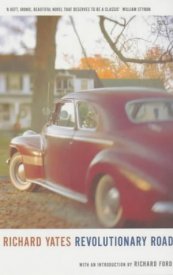Amazon.co.uk Review
Originally published in 1961 to great critical acclaim, Richard Yates's Revolutionary Road subsequently fell into obscurity in the UK, only to be rediscovered in a new edition published in 2001. Its rejuvenation is due in large part to its continuing emotional and moral resonance for an early 21st-century readership. April and Frank Wheeler are a young, ostensibly thriving couple living with their two children in a prosperous Connecticut suburb in the mid-1950s. However, like the characters in John Updike's similarly themed Couples, the self-assured exterior masks a creeping frustration at their inability to feel fulfilled or happy in their relationships or careers. Frank is mired in a well-paid but boring office job and April is a housewife still mourning the demise of her hoped-for acting career. Determined to identify themselves as superior to the mediocre sprawl of suburbanites who surround them, they decide to move to France where they will be better able to develop their true artistic sensibilities, free of the consumerist demands of capitalist America. However, as their relationship deteriorates into an endless cycle of squabbling, jealousy and recriminations, their trip and their dreams of self-fulfilment are thrown into jeopardy. Yates's incisive, moving and often very funny prose weaves a tale that is at once a fascinating period piece and a prescient anticipation of the way we live now. Many of the cultural motifs now seem quaintly dated--the early evening cocktails, Frank's illicit lunch breaks with his secretary, the way Frank isn't averse to knocking April around when she speaks out of turn all seem to belong to a different world--and yet the quiet desperation at thwarted dreams reverberates as much now as it did 40 years ago. Like F Scott Fitzgerald's The Great Gatsby, this novel conveys, with brilliant erudition, the poverty at the soul of many wealthy Americans and the exacting cost of chasing the American Dream. --Jane Morris
Synopsis
The story of Frank and April Wheeler, a bright, beautiful and talented couple who have lived on the assumption that greatness is just around the corner. With heartbreaking compassion and remorseless clarity, Richard Yates shows how they mortgage their spiritual birthright, betraying themselves and each other.




